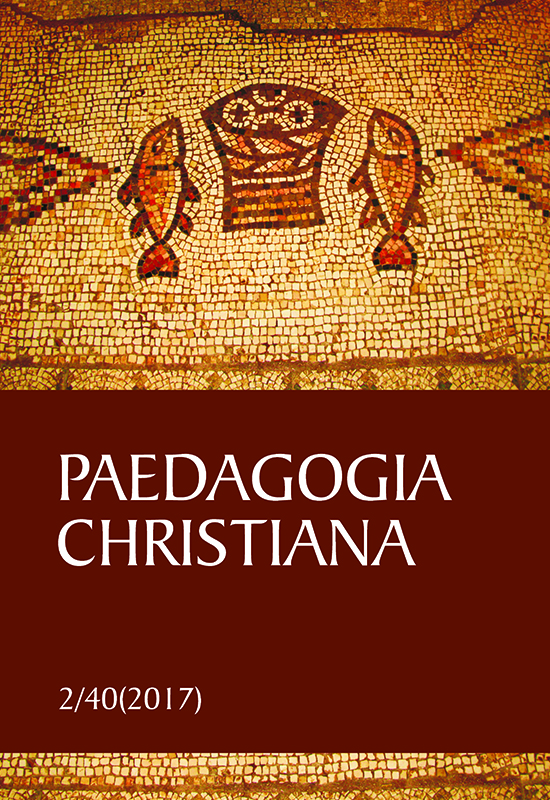Upbringing or Improvement? On the Anti-Christian Roots and Pedagogical Implications of Transhumanism
DOI:
https://doi.org/10.12775/PCh.2017.026Keywords
transhumanism, Christianity, education, acting, producing, anthropologyAbstract
The main objective of the article is to present the anti-Christian roots of the transhumanist thought and a critical analysis of its pedagogical implications. My main hypothesis is that in the spirit of exclusive humanism the techno-progressive movement pushes forward an anti-Christian image of man, which conceptualizes human existence beyond the foregoing anthropological-pedagogical categories. I will argue that only by reinforcing anthropological reflection upon the meaning of education we might be able to conduct preventive strategies against the contemporary tendencies of the reification and depersonalization of the human. To that end I will try to show that the transhumanist analogy between “enhancement” through education and “technological enhancement” ignores the qualitative difference between two forms of human activity – action and production. In order to stress the anti-Christian character of the concept of technological human enhancement I will try to refer this issue to Joseph Ratzinger’s thought on the transition from ancient and scholastic anthropology to the modern image of man as a productive human being, whose existence underlies the logics of constant transformation.References
Adamski, Krzysztof. „Transhumanizm − między utopią biotechnologii a gnozą”. Roczniki Teologii Moralnej 59 (2012): 105–129.
Bociek, Klaudyna, Danuta Wajsprych. „Exclusive humanism as a challenge for moral-ethical upbringing”. Horyzonty Wychowania 33 (2016): 39–50.
Bostrom, Nick. “A History of Transhumanist Thought”. Journal of Evolution and Technology 14 (2005): 1–25.
Bostrom, Nick. „Transhumanist Values”. Journal of Philosophical Research 30 (2005), Issue Supplement: 3–14.
Dec, Ignacy. „Humanizmy i ich roszczenia w wyjaśnianiu człowieka”. W: Błąd antropologiczny, red. Andrzej Maryniarczyk, Katarzyna Stępień, 49–72. Lublin: Polskie Towarzystwo Tomasza z Akwinu, 2003.
Fuller, Steve, Veronika Lipińska. The Proactionary Imperative: A Foundation for Transhumanism. Basingstoke: palgrave Macmillan, 2014.
Głowacka, Paulina, Klaudia Kowalska, Hanna Walkowiak, Małgorzata Janczarczyk, Michał Klichowski. „Jaka wizja edukacji wyłania się z transhumanistycznego chaosu”. Podstawy Edukacji 8 (2015): 155–171.
Hołub, Grzegorz. „Karol Wojtyła on the metaphysics of the person”. Logos i Ethos 39 (2015): 97–115.
Hołub, Grzegorz. „Transhumanizm a koncepcja osoby”. Ethos 111 (2015): 83–94.
Hughes, James. „Contradictions from the Enlightenment Roots of Transhumanism”. Journal of Medicine and Philosophy 35 (2010): 622–640.
Hughes, James. „Transhumanism and Personal Identity”. W: The Transhumanist Reader, red. Max More, Natasha Vita-More, 227–233. West Sussex: Wiley-Blackwell, 2013.
Klichowski, Michał. Narodziny cyborgizacji. Nowa eugenika, transhumanizm i zmierzch edukacji. Poznań: Wydawnictwo Naukowe UAM, 2014.
Kopania, Jerzy. Etyczny wymiar cielesności. Inspiracje kartezjańskie. Kraków: Aureus, 2002.
Kurzweil, Ray. The Singularity is Near: When Humans transcend Biology. New York: Penguin, 2006.
Łatacz, Ewa. „Osoba i czyn Karola Wojtyły przesłaniem dla personalistycznej filozofii wychowania”. W: Idee pedagogiki filozoficznej, red. Sławomir Sztobryn, Bogusław Śliwerski, 110–123. Łódź: Wydawnictwo Uniwersytetu Łódzkiego, 2003.
Łażewska, Dorota A. „Dekonstrukcja logosu jako zagrożenie dla życia religijnego”. Paedagogia Christiana 1 (2015): 141–159.
Maliszewski, Krzysztof. „Poszukiwanie języka pedagogicznego (inspiracje sejneńskie)”. W: Krzysztof Maliszewski, Pedagogika na pograniczu światów, 237–257. Katowice: Wydawnictwo Uniwersytetu Śląskiego, 2015.
Meilaender, Gilbert. “Products of the Will: Robertson’s Children of Choice”. Washington and Lee Law Review 52 (1995): 173–195.
More, Max. „The Philosophy of Transhumanism”. W: The Transhumanist Reader, red. Max More, Natasha Vita-More, 3–17. West Sussex: Wiley-Blackwell, 2013.
More, Max. „Transhumanism: Towards a futurist philosophy”. Extropy 6 (1990): 6–12.
http://fennetic.net/irc/extropy/ext6.pdf (dostęp: 01.06.2017).
Nowak, Marian. „Czy wychowanie bez celu?”. Paedagogia Christiana 1 (2012): 49–67.
Ratzinger, Joseph. Einführung in das Christentum. München: Kösel, 2000.
Ratzinger, Joseph. Wprowadzenie w chrześcijaństwo. Tłum. Zofia Włodkowa. Kraków: Znak, 2012.
Robertson, John A. Children of Choice: Freedom and the New Reproductive Technologies. Princeton: Princeton University Press, 1994.
Rutkowski, Jan. Zmierzch kształcenia? Wybrane implikacje pedagogiczne filozofii Leo Straussa i Erica Voegelina. Warszawa: Wydawnictwo Uniwersytetu Warszawskiego, 2012.
Sorgner, Stefan L. Transhumanismus: „die gefährlichste Idee der Welt“!? Freiburg im Breisgau: Herder, 2016.
Szymala, Katarzyna. „Działanie człowieka jako kategoria różnicująca i jej implikacje dla pedagogiki”. Forum Pedagogiczne 2 (2015): 63–75.
Szymański, Kamil. „Transhumanizm”. Kultura i Wartości 13 (2015): 133–152.
Wojtyła, Karol. Osoba i czyn. Kraków: Polskie Towarzystwo Teologiczne, 1985.
Downloads
Published
How to Cite
Issue
Section
Stats
Number of views and downloads: 650
Number of citations: 0



